Polyphenol-rich Sargassum horneri alleviates atopic dermatitis-like skin lesions in NC/Nga mice by suppressing Th2-mediated cytokine IL-13
IF 2.4
3区 生物学
Q1 MARINE & FRESHWATER BIOLOGY
引用次数: 1
Abstract
Atopic dermatitis (AD) is one of major skin inflammatory diseases characterized by excessive Th2-mediated immune responses. Recent evidence provides that interlukin-13 (IL-13) plays the role of a key Th2 cytokine that drives the inflammation underlining AD. Due to adverse effects of commercially available synthetic drugs, the need for treatments based on natural products is gaining much attention. Sargassum horneri is an edible brown algae known for beneficial bioactivities including anti-inflammation. We investigated if polyphenol-rich S. horneri extracts (SHE) could suppress AD-like skin lesions in NC/Nga mice and if that involved inhibition of the infiltration of Th2-mediated cytokine IL-13. We observed markedly increased infiltration of IL-13 positive cells in AD-like skin lesions of mice but SHE treatments decreased it. Also, the dermal expression of IL-13 was sufficient to cause inflammatory responses in mice skin resembling human AD. SHE suppressed the dermal infiltration of inflammatory cells where IL-13 plays a crucial role in skin tissues and in the recruitment of inflammatory cells. Furthermore, it was confirmed that SHE reduced T cell, dendritic cell, and macrophage populations in spleen. Moreover, SHE decreased the collagen deposition in skin and ear dermis resulting in reduced fibrosis that occurs in AD due to excessive collagen. Taken together, our results reveal that SHE suppressed the infiltration of inflammatory cells into skin dermis by decreasing the infiltration of IL-13 positive cells. Therefore, SHE could be taken as a useful therapeutic agent to alleviate AD.富多酚马尾草通过抑制th2介导的细胞因子IL-13减轻NC/Nga小鼠特应性皮炎样皮肤病变
特应性皮炎(AD)是一种主要的皮肤炎症性疾病,其特征是th2介导的免疫反应过度。最近的证据表明,白细胞介素-13 (IL-13)在驱动AD炎症的关键Th2细胞因子中起作用。由于市售合成药物的副作用,对基于天然产物的治疗的需求正受到越来越多的关注。马尾藻是一种可食用的褐藻,具有抗炎症等有益生物活性。我们研究了富多酚金针叶提取物(SHE)是否能抑制NC/Nga小鼠ad样皮肤病变,以及是否涉及抑制th2介导的细胞因子IL-13的浸润。我们观察到小鼠ad样皮损中IL-13阳性细胞的浸润明显增加,但SHE治疗使其减少。此外,IL-13的真皮表达足以引起小鼠皮肤类似人AD的炎症反应。SHE抑制炎症细胞的真皮浸润,其中IL-13在皮肤组织和炎症细胞募集中起着至关重要的作用。此外,证实SHE减少了脾脏中的T细胞、树突状细胞和巨噬细胞数量。此外,SHE减少了皮肤和耳真皮层中的胶原沉积,从而减少了AD患者因胶原过多而发生的纤维化。综上所述,我们的研究结果表明,SHE通过减少IL-13阳性细胞的浸润来抑制炎症细胞向真皮的浸润。因此,SHE可作为一种有效的治疗AD的药物。
本文章由计算机程序翻译,如有差异,请以英文原文为准。
求助全文
约1分钟内获得全文
求助全文
来源期刊

Algae
PLANT SCIENCES-
CiteScore
5.10
自引率
25.00%
发文量
18
期刊介绍:
ALGAE is published by the Korean Society of Phycology and provides prompt publication of original works on phycology. ALGAE publishes articles on all aspects of phylogenetics and taxonomy, ecology and population biology, physiology and biochemistry, cell and molecular biology, and biotechnology and applied phycology. Checklists or equivalent manu-scripts may be considered for publication only if they contribute original information on taxonomy (e.g., new combinations), ecology or biogeography of more than just local relevance. Contributions may take the form of Original Research Articles, Research Notes, Review Articles and Book Reviews.
 求助内容:
求助内容: 应助结果提醒方式:
应助结果提醒方式:


